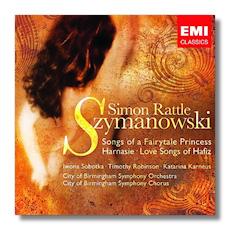
The Internet's Premier Classical Music Source
Related Links
- Szymanowski Reviews
- Latest Reviews
- More Reviews
-
By Composer
-
Collections
DVD & Blu-ray
Books
Concert Reviews
Articles/Interviews
Software
Audio
Search Amazon
Recommended Links
Site News
 CD Review
CD Review
Karol Szymanowski

Princesses and Bandits and Caliphs
- Songs of a Fairy-tale Princess, Op. 31
- Harnasie, Op. 55
- Love Songs of Hafiz, Op. 26
Iwona Sobotka, soprano
Katarina Karneus, mezzo-soprano
Timothy Robinson, tenor
City of Birmingham Symphony Chorus & Orchestra/Simon Rattle
EMI 3-64435-2 65:15
Summary for the Busy Executive: Beautiful.
Karol Szymanowski, the great Polish composer after Chopin and before Bacewicz and Lutosławski, worked long and hard to find his true voice. He began as a follower of Richard Strauss and then fell under the influence of Impressionism. Around the end of World War I, Stravinsky – particularly the Stravinsky of Pétrouchka – changed his music profoundly. Szymanowski, following the Russian's example, began to absorb his native folklore in order to fashion his own brand of Modernism. The three periods don't stand discretely apart. There's plenty of blurring, particularly between the second and third phases of Szymanowski's creative career. Furthermore, Szymanowski writes so masterfully, that he produces great work in all three periods. I admit to having the most problems with the Impressionist pieces. Almost all of them spring from an Oriental, hot-house exoticism (especially the Third Symphony) that simply makes me cringe, but I have to admit the craft and imagination that goes into them.
Two of the three works – Songs of a Fairy-Tale Princess and Love Songs of Hafiz – typify Szymanowski's impressionist manner. Up to now, I couldn't stand them. It turns out, however, that I've heard less-than-stellar performances. Rattle and his soloists turn these works into things of searing beauty. Both began life for piano and voice. Szymanowski orchestrated the complete Hafiz and three of the original six Princess songs. The Princess songs, to poems by the composer's sister, typically speak of lonely, unrequited love. The narrator, usually alone at night, sings to the sky. Each song begins with a wordless roulade of notes, always expressing emotion so intense that it bypasses speech. I've heard the complete set in their original piano incarnation, and the orchestrations lift them into a different realm. You can scarcely believe you hear the same music. The Love Songs of Hafiz, from a few years later, set Hans Bethge's translation of Persian poetry. Bethge had earlier caused a revolution in German poetry with his translations from the Chinese, some of which formed the basis of Mahler's Das Lied von der Erde. The drooping-lily languor of Hafiz (and its counterpart, Love Songs of the Foolish Muezzin from, I believe, 1911) drive me up the wall. Again, however, the performers transform the work into something more vigorous and emotionally direct.
The ballet Harnasie, from the final period, throws over the velvet traces of the previous scores. Even those who think of Polish music as Chopin and his imitators might find the ballet a sudden slap in the face. Based on a kind of Lochinvar story, the ballet really provides an excuse to dig deep into Polish folk music as an expression of both nationalism and primitivism. Stravinsky – particularly the more raucous bits of Firebird and Pétrouchka and to some extent Rite of Spring – comes to mind more than once, but overall the ballet makes a strongly individual impression. Stamping rhythms alternate with long, yearning melodies intertwining with one another, like folksingers who riff on one another's tunes. In the latter, one often gets the feeling of night, the elemental underpinning of a Chopin nocturne. Ironically (considering the conscious attempt to express the Polish soul), the ballet never found a stage production in Poland during the composer's lifetime. Polish music may have been dominated for too long by second-hand Chopins, aping the surface, rather than the substance of that music.
The music fits Rattle down to the ground. I've always considered his strong suits drama and color. I'm not so sure I'd like to hear his Mozart or Brahms, but he certainly comes up a winner here. The two song cycles achieve ecstatic intensity, rather than drown a listener in the usual heavy perfume. Come to think of it, that may well be what Szymanowski had in mind. The Harnasie is all animal spirits, and "The Raid of the Harnasie," the climax of the piece – a glorious riot of brass, cymbal crashes, and choir – should lift you out of your socks.
Copyright © 2008, Steve Schwartz




















